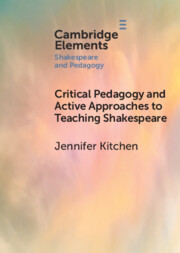83 results
11 - Radical Ethics
- from Part I - Traditions in Ethics and Education
-
-
- Book:
- The Cambridge Handbook of Ethics and Education
- Published online:
- 07 March 2024
- Print publication:
- 14 March 2024, pp 213-236
-
- Chapter
- Export citation
4 - Theoretical Approaches
- from Part I - Contexts
-
-
- Book:
- The Cambridge History of Old Norse-Icelandic Literature
- Published online:
- 08 February 2024
- Print publication:
- 29 February 2024, pp 72-90
-
- Chapter
- Export citation
18 - Nonprofits as Creators of Transformative Symbolic Reality
- from Part III - New Directions
-
-
- Book:
- Reimagining Nonprofits
- Published online:
- 11 January 2024
- Print publication:
- 01 February 2024, pp 353-371
-
- Chapter
- Export citation
13 - A TWAIL Engagement with Customary International Investment Law
- from Part III - Interpreting Customary International Rules
-
-
- Book:
- Custom and its Interpretation in International Investment Law
- Published online:
- 04 January 2024
- Print publication:
- 18 January 2024, pp 307-332
-
- Chapter
-
- You have access
- Open access
- HTML
- Export citation
Critical theory and memory politics: leftist autocritique after the Ukraine war
-
- Journal:
- International Journal of Law in Context , First View
- Published online by Cambridge University Press:
- 30 November 2023, pp. 1-20
-
- Article
-
- You have access
- Open access
- HTML
- Export citation

Critical Pedagogy and Active Approaches to Teaching Shakespeare
-
- Published online:
- 14 November 2023
- Print publication:
- 07 December 2023
-
- Element
- Export citation
Chapter 3 - Alienation (Plessner – Adorno)
-
- Book:
- Alone with Others
- Published online:
- 26 October 2023
- Print publication:
- 09 November 2023, pp 63-82
-
- Chapter
- Export citation
“Une pièce d’étoffe que nous aurons à faire”: Louis Riel's Utopia: Between Prophecy and Politics
-
- Journal:
- Canadian Journal of Political Science/Revue canadienne de science politique / Volume 56 / Issue 4 / December 2023
- Published online by Cambridge University Press:
- 06 November 2023, pp. 917-935
-
- Article
-
- You have access
- Open access
- HTML
- Export citation
Alienation commodification: a critique of the role of EU consumer law
-
- Journal:
- European Law Open / Volume 2 / Issue 2 / June 2023
- Published online by Cambridge University Press:
- 31 October 2023, pp. 405-423
-
- Article
-
- You have access
- Open access
- HTML
- Export citation
2 - Norms and Practice
- from Part I
-
- Book:
- On Global Learning
- Published online:
- 07 September 2023
- Print publication:
- 21 September 2023, pp 39-73
-
- Chapter
- Export citation
Chapter 12 - Natural History and the Anthropocene
- from Part II - The Literary Works
-
-
- Book:
- W. G. Sebald in Context
- Published online:
- 24 August 2023
- Print publication:
- 07 September 2023, pp 102-109
-
- Chapter
- Export citation
A Sociological Perspective on Meaningful Work: Community versus Autonomy
-
- Journal:
- Business Ethics Quarterly , First View
- Published online by Cambridge University Press:
- 06 September 2023, pp. 1-31
-
- Article
- Export citation
Critique of digital constitutionalism: Deconstruction and reconstruction from a societal perspective
-
- Journal:
- Global Constitutionalism , First View
- Published online by Cambridge University Press:
- 31 August 2023, pp. 1-31
-
- Article
-
- You have access
- Open access
- HTML
- Export citation
4 - Concepts
- from Part I - Developing a Methodology
-
-
- Book:
- Conducting Research on Global Environmental Agreement-Making
- Published online:
- 07 August 2023
- Print publication:
- 10 August 2023, pp 58-73
-
- Chapter
- Export citation
Failures of comparability in global governance: Exploring the practical dimension of the redress of law
-
- Journal:
- European Law Open / Volume 2 / Issue 1 / March 2023
- Published online by Cambridge University Press:
- 29 June 2023, pp. 173-183
-
- Article
-
- You have access
- Open access
- HTML
- Export citation
Chapter 1 - The context for practice with children, young people, and their families
-
-
- Book:
- Working with Families Experiencing Vulnerability
- Published online:
- 03 April 2023
- Print publication:
- 09 May 2023, pp 7-26
-
- Chapter
- Export citation
13 - Critical Theory, Local Moral Perception, and Democratic Education
- from Part Two - Philosophical and Normative Foundations
-
-
- Book:
- The Cambridge Handbook of Democratic Education
- Published online:
- 20 April 2023
- Print publication:
- 27 April 2023, pp 196-229
-
- Chapter
- Export citation
Post-truth politics and neoliberal competition: the social sources of dogmatic cynicism
-
- Journal:
- International Theory / Volume 16 / Issue 1 / March 2024
- Published online by Cambridge University Press:
- 12 April 2023, pp. 102-121
-
- Article
-
- You have access
- Open access
- HTML
- Export citation
9 - Wittgenstein’s Apocalyptic Subjectivity
-
-
- Book:
- Wittgenstein and Literary Studies
- Published online:
- 05 December 2022
- Print publication:
- 23 February 2023, pp 194-213
-
- Chapter
- Export citation
Chapter 4 - War and Critical Theory
- from Part I - Origins and Theories
-
-
- Book:
- War and Literary Studies
- Published online:
- 15 January 2023
- Print publication:
- 05 January 2023, pp 67-84
-
- Chapter
- Export citation



